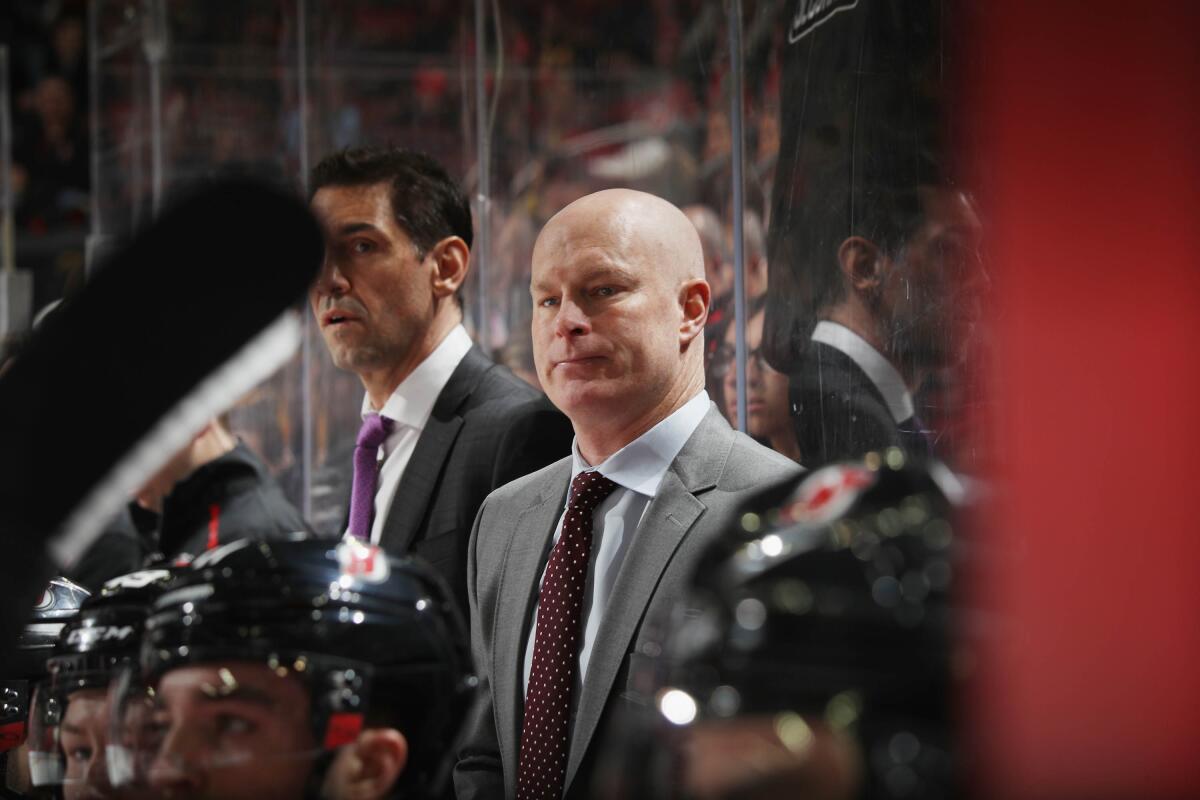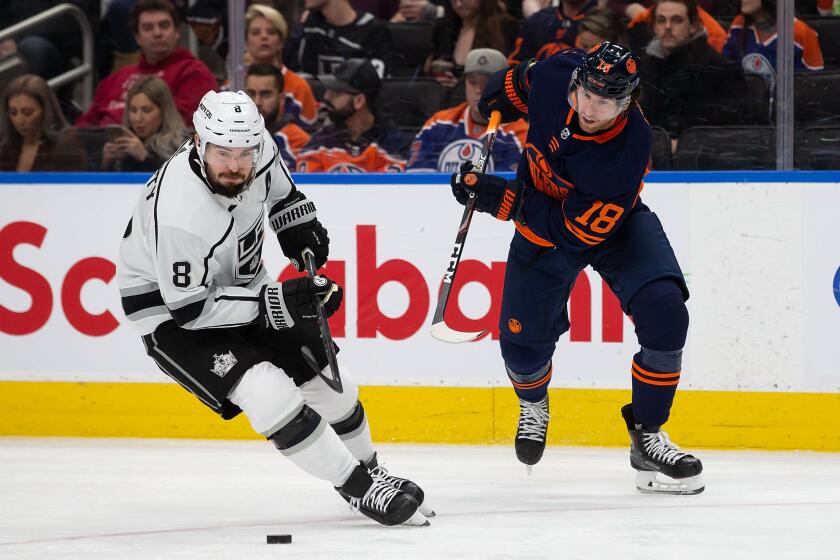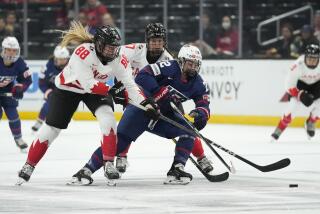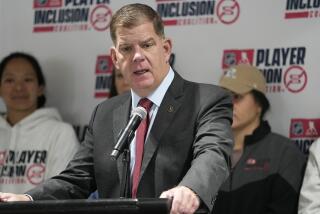Column: NHL observations: Mark Pavelich case is one of sadness and frustration
- Share via
Mark Pavelich was a reluctant star with the gold medal-winning 1980 U.S. Olympic hockey team and, later, in the NHL. He was small but quick and creative, perfect for coach Herb Brooks’ Olympic squad and Brooks’ perpetual-motion New York Rangers.
Pavelich’s 76 points in 1981-82 remains the Rangers’ season record by a rookie, but he wasn’t destined for a long career. He hated the goonery and dump-and-chase garbage that began to dominate, and he went home to live in the woods of northern Minnesota.
He rarely attended Olympic reunions but drove 22 hours to join his teammates at the 2002 NHL All-Star game in Los Angeles. “It was just that time,” he told The Times then. He was prescient: It was the last occasion they were all together because Brooks died in a car crash the following summer.
Pavelich left hockey but the sport apparently left a tragic mark on him. He was arrested in August and charged with beating a friend with a metal pole, and last week a Minnesota district judge ruled that Pavelich is mentally ill and dangerous before ordering him committed to a secure treatment facility.
The order took into account reports from two clinical psychologists who found Pavelich had post-traumatic stress disorder, delusions, paranoia and other conditions likely related to head injuries. He opposed treatment and will have another hearing in February to decide if he should remain committed for an indeterminate amount of time.
Edmonton Oilers’ star Connor McDavid has a special burden as the best player in the NHL trying to get his team to playoff glory, much like Mike Trout.
Barry Beck, Pavelich’s Rangers teammate, is in touch with Pavelich’s sister, Jean Gevik, and has organized a group of former players to seek resources for Pavelich and other players who have mental health issues. Beck said they’ve gotten nowhere with the NHL or individual clubs; the NHL Players’ Assn. declined to comment, saying it doesn’t discuss individual players’ circumstances.
“If Mark is kept detained for at least a year, we all fear he won’t make it,” Beck said from Hong Kong, where he is the general manager of the Hong Kong Academy of Ice Hockey. “Our group are all positive people, but Mark needs help now. He should not be institutionalized. This will not benefit him.”
Beck had hoped Pavelich would be allowed to undergo therapy at the Nevada ranch of former NHL goaltender Clint Malarchuk, who also struggled with mental health issues and now works with veterans who have similar problems. That won’t happen now.
“Ultimately we have to listen to what the doctors say, the experts in the field as far as the medical diagnosis, but it’s hard to believe there isn’t a better way than just incarcerating somebody and then hoping the system takes care of him there,” said former NHL goalie Corey Hirsch, another member of the group and an advocate of removing the stigma often attached to mental health issues.
“Where is he going, and what kind of help is he going to receive? If it is brain damage, is it regenerative? Can we fix it? Is there something the NHL or NHLPA can do? This guy paid his dues for a long time to the NHLPA. Where are they? That’s kind of where we’re at as a group. We’re just frustrated with the mental health system and the way mental health is dealt with in the hockey world.”
Beck said the NHL Alumni Assn. is trying to help but he wants the NHL to step up. That’s probably wishful thinking, since Commissioner Gary Bettman has said there is no proven link between concussions and symptoms of chronic traumatic encephalopathy (CTE).
“Who can help Mark and his sister? This also opens up the question of who can help other players and their families. Players in Europe also need help. What about the player that doesn’t want any help?” Beck said. “They feel betrayed by the league they have given a big part of their life to. They refused help. It could be their pride or they’ve been hurt beyond repair. There could be substance abuse issues. They are in pain and need immediate help.”
The Kings kicked off a difficult, road-heavy stretch of their schedule with 2-1 loss to the Edmonton Oilers that had a familiar pattern to it.
Hirsch said the NHL/NHLPA Substance Abuse and Behavioral program does good work but more needs to be done “because there’s guys like Mark Pavelich out there. There’s guys like my teammate Greg Johnson, who took his own life in Detroit this summer,” Hirsch said. “Those won’t be the last, I guarantee you.”
Change coming from Peters’ firing
The NHL Board of Governors is scheduled to meet next week, and its agenda is expected to include proposals for a coaches code of conduct and safeguards for players who report verbal or physical abuse by coaches.
The Calgary Flames fired coach Bill Peters after he admitted he used racial slurs in speaking to Akim Aliu with minor-league Rockford (Ill.) and it was confirmed he physically struck two players while coaching the Carolina Hurricanes. Aliu met with Bettman and deputy commissioner Bill Daly last week and might have a role in devising the new code.
Other players have cited abusive behavior by coaches. Sean Avery’s account of being kicked by Marc Crawford, then the Kings’ coach and now an assistant in Chicago, led the Blackhawks to tell Crawford to stay away for a while.
Also, former Detroit forward Johan Franzen told the Swedish newspaper Expressen he had nightmares about verbal attacks by coach Mike Babcock, adding, “He’s a terrible person, the worst I have ever met. He’s a bully who was attacking people. It could be a cleaner at the arena in Detroit or anybody.”
Big off-ice win for the Flames
A deal was reached in Calgary last week for an arena that will replace the Saddledome. According to the CBC, the Flames will pay $275 million and taxpayers will pay $290 million (all figures Canadian dollars), fanning opposition among residents in a city that has cut jobs and services. The new arena is scheduled to open in 2024.
The Saddledome opened in 1983 and was built for the 1988 Calgary Olympics. It’s the third-oldest NHL arena, behind New York’s Madison Square Garden (1968) and Nassau Coliseum (1972). The Honda Center in Anaheim, which opened in 1993 and has undergone many renovations, ranks fourth.
Devils send Hynes to, well….

John Hynes got a reprieve in October when assistant general manager Tom Fitzgerald joined him as an assistant coach in an effort to overcome New Jersey’s poor start, but Hynes’ firing Tuesday was sealed by a 4-0 loss to the Rangers and an utterly inept 7-1 loss to Buffalo. Alain Nasreddine took over as interim coach of a team that has had terrible goaltending and special teams play. Look for the Devils to soon trade forward Taylor Hall, an impending free agent.
More to Read
Go beyond the scoreboard
Get the latest on L.A.'s teams in the daily Sports Report newsletter.
You may occasionally receive promotional content from the Los Angeles Times.










